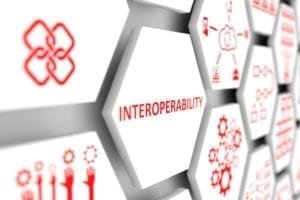The following is a guest article by Anthony Murray, Chief Interoperability Officer at MRO
In the ever-evolving landscape of healthcare, the quest for interoperability has become paramount. While the vision of seamless data exchange promises improved patient care and streamlined operations, the journey is not without its hurdles. Here we explore the three main interoperability challenges that continue to shape the narrative in healthcare.
- Fragmented Systems and Standards: One of the primary stumbling blocks in achieving interoperability is the existence of fragmented systems and divergent standards. Healthcare organizations often operate on disparate electronic health record (EHR) systems, each with their own unique structure and data format. This lack of standardization creates roadblocks in sharing and interpreting data across different platforms. Additionally, the absence of universally accepted standards impedes the seamless flow of information between healthcare providers, payers, and other stakeholders. The industry’s push towards standardized data models and interoperability frameworks is a crucial step in overcoming this challenge. Bridging this gap requires a concerted effort towards standardization, establishing common data models, and promoting the adoption of interoperability standards to ensure seamless communication between systems.
- Data Security and Privacy Concerns: The sensitive nature of healthcare data raises significant concerns about data security and patient privacy. Healthcare providers possess a wealth of sensitive information, and the interoperability drive necessitates the sharing of this data across networks. While interoperability aims to facilitate this unhindered data exchange, healthcare organizations must navigate a delicate balance between sharing critical information and safeguarding patient privacy. Ensuring that robust security measures are in place becomes paramount to prevent unauthorized access, data breaches, and misuse of patient information. Striking a delicate balance between the imperative for interoperability and the critical need to safeguard patient confidentiality is a tightrope act that requires collaborative efforts, technological advancements, and adherence to stringent privacy regulations.
- Resistance to Workflow Changes: Implementing interoperability solutions often encounters resistance due to ingrained cultural and workflow norms within healthcare organizations. Both providers and payers may be accustomed to operating within siloed systems, and the prospect of adopting interoperable practices can be met with reluctance. Resistance to change, whether rooted in traditional practices or concerns about the learning curve associated with new technologies, poses a significant challenge. Overcoming such resistance requires addressing concerns about workflow disruption, providing comprehensive training programs, and cultivating a culture that embraces innovation and collaboration. Aligning organizational processes with the interoperability agenda, while fostering a culture of collaboration and openness to innovate, is essential for the successful integration of these transformative technologies.
As healthcare providers and payers navigate these interoperability challenges, it is crucial to recognize that overcoming these hurdles is not only a technological feat but also a cultural and organizational transformation. Collaboration, communication, and a shared commitment to interoperability standards will be key in paving the way for a healthcare ecosystem where data flows seamlessly, ultimately benefiting both providers and payers in their mission to deliver high-quality, patient-centered care.
Organizations such as MRO are essential to addressing these challenges head-on. Through such a partnership, payers and providers can overcome fragmented systems, fortify data security, and foster a culture of change to pave the way for seamless data exchange.
Interested in learning more? Check out two upcoming presentations at ViVE and HIMSS in the coming weeks, where MRO discusses strives being made in the interoperability space through a partnership with CareFirst BlueCross BlueShield.
Monday, February 26, 2024 at 10:10am PT – Streamlining Healthcare Data Exchange between Providers and Payers: CareFirst BlueCross BlueShield and Partner Experiences, Mo Weitnauer (MRO) and Piyush Khanna (CareFirst)
Tuesday, February 27, 2024 at 2:55pm PT – Facilitating Seamless Clinical Data Exchange for Optimal Data Usability, Anthony Murray (MRO)
HIMSS Interoperability Showcase
Tuesday, March 12, 2024 at 1:15pm ET – Facilitating Seamless Clinical Data Exchange for Optimal Data Usability, Anthony Murray (MRO)
Wednesday, March 13, 2024 at 10:15am ET – Streamlining Healthcare Data Exchange between Providers and Payers: CareFirst BlueCross BlueShield and Partner Experiences, Yana Ankudinova (MRO) and Piyush Khanna (CareFirst)
 About Anthony Murray
About Anthony Murray
In his role as Chief Interoperability Officer, Murray oversees MRO’s strategic initiatives related to accelerating clinical data exchange. In addition to overseeing the clinical data exchange team, Anthony also is responsible for the interoperability, systems integrations, and security teams, to utilize advanced technologies to deliver secure, meaningful information exchange. Anthony, as a Certified Information Systems Security Professional (CISSP), serves as the company’s Information Systems Security Officer (ISSO) and is positioned to provide common oversight of the security of MRO’s clinical data exchange. He partners closely with MRO’s privacy, compliance and innovation thought leaders, to assess all areas of the clinical data exchange and to provide value through modern, secure technologies. Anthony has over 20 years of experience in technology and security supporting the healthcare industry vertical, including release of information, clinical manufacturing and pharmaceuticals.
MRO is a proud sponsor of Healthcare Scene
Get Fresh Healthcare & IT Stories Delivered Daily
Join thousands of your healthcare & HealthIT peers who subscribe to our daily newsletter.




